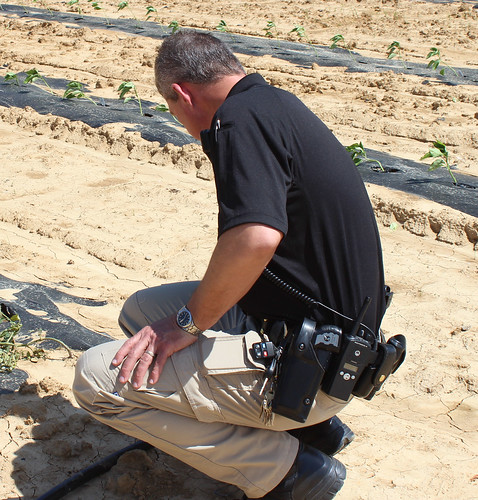
Kentucky Jailer Joe Blue is passionate about rehabilitating inmates. Innovative ideas for teaching new skills are always on his mind, which is how the Hopkins County jail’s gardening program was started.
The Kentucky jail sits on several acres and has a large farm just across the street. As Blue was walking around the property one day, he looked across the street and thought: “What’s the difference in that land and our land? Why can’t we grow our own food here?”
Soon after, Blue and staff launched the gardening program. The garden started on only one acre of the property in 2006 and has grown to encompass several more acres. Over the years, the jail’s garden has produced more than 36,000 pounds of corn, 25,000 pounds of tomatoes, 15,000 pounds of squash and various other fruits and vegetables.
“The program allows us to reduce food costs considerably and at the same time provide fresh and nutritious food to the inmates,” Blue said.
Feeding the inmates in the 461-bed facility requires a lot of food. The jail serves about 1,200 meals a day. Tomatoes are one item used in many of the inmate’s meals. Wanting to grow more tomatoes and extend their growing period was what prompted Deputy Billy Thomas, who oversees the jail program, to look into constructing a seasonal high tunnel.
Thomas heard about the Seasonal High Tunnel Initiative offered by USDA’s Natural Resources Conservation Service, (NRCS). Seasonal high tunnels are plastic-covered structures that enable farmers to have crops ready earlier or later in the season. In high tunnels, plants are grown directly in the ground, and the temperature is regulated by opening or closing the plastic curtain sides and doors on the ends.
Thomas contacted Pennie Day, natural resource planner at the local NRCS office, to inquire about the possibility of constructing a high tunnel on the jail’s property with NRCS assistance.
Funding through the Environmental Quality Incentives Program is available for work on private lands. As a public entity, the jail was not eligible for financial assistance. But Day thought of another opportunity – the Hopkins County Conservation District board.
The district purchased the jail’s seasonal high tunnel. Day provided the technical assistance for the high tunnel during the planning and construction phases. She will continue to assist through the growing seasons to improve the health of the soil and ensure successful harvests, season after season.
Growing their own food is certainly helping the jail’s bottom line, but the investment made in the inmates who participate in the program is of even greater importance.
“We want (the inmates) to learn a trade while they are here and be able to find work using those skills when the leave,” Blue said.
In addition to the funding provided by the Hopkins County Conservation District for the high tunnel’s construction, donations and discounts from community businesses help keep the costs down. Surplus from the garden is donated to the local Salvation Army and Senior Citizens Center of Hopkins County. To find out more about high tunnels, visit your nearest NRCS service center.

